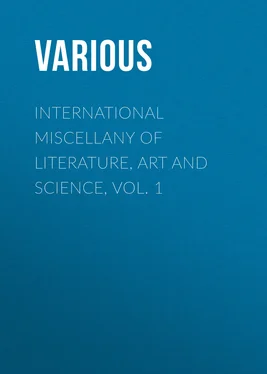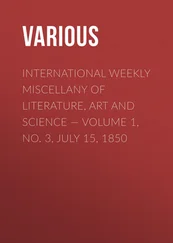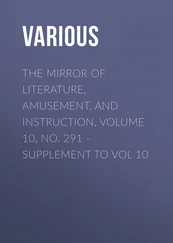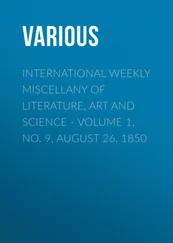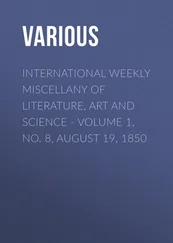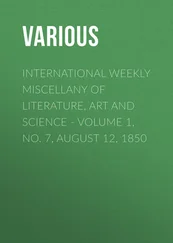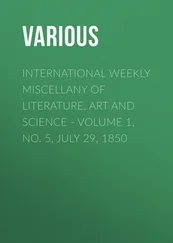Various - International Miscellany of Literature, Art and Science, Vol. 1
Здесь есть возможность читать онлайн «Various - International Miscellany of Literature, Art and Science, Vol. 1» — ознакомительный отрывок электронной книги совершенно бесплатно, а после прочтения отрывка купить полную версию. В некоторых случаях можно слушать аудио, скачать через торрент в формате fb2 и присутствует краткое содержание. Жанр: foreign_antique, periodic, foreign_edu, на английском языке. Описание произведения, (предисловие) а так же отзывы посетителей доступны на портале библиотеки ЛибКат.
- Название:International Miscellany of Literature, Art and Science, Vol. 1
- Автор:
- Жанр:
- Год:неизвестен
- ISBN:нет данных
- Рейтинг книги:3 / 5. Голосов: 1
-
Избранное:Добавить в избранное
- Отзывы:
-
Ваша оценка:
- 60
- 1
- 2
- 3
- 4
- 5
International Miscellany of Literature, Art and Science, Vol. 1: краткое содержание, описание и аннотация
Предлагаем к чтению аннотацию, описание, краткое содержание или предисловие (зависит от того, что написал сам автор книги «International Miscellany of Literature, Art and Science, Vol. 1»). Если вы не нашли необходимую информацию о книге — напишите в комментариях, мы постараемся отыскать её.
International Miscellany of Literature, Art and Science, Vol. 1 — читать онлайн ознакомительный отрывок
Ниже представлен текст книги, разбитый по страницам. Система сохранения места последней прочитанной страницы, позволяет с удобством читать онлайн бесплатно книгу «International Miscellany of Literature, Art and Science, Vol. 1», без необходимости каждый раз заново искать на чём Вы остановились. Поставьте закладку, и сможете в любой момент перейти на страницу, на которой закончили чтение.
Интервал:
Закладка:
But he could not bear his good fortune. On receiving a month's salary he gave himself up to habits which only necessity had restrained at Baltimore. For a week he was in a condition of brutish drunkenness, and Mr. White dismissed him. When he became sober, however, he had no recourse but in reconciliation, and he wrote letters and induced acquaintances to call upon Mr. White with professions of repentance and promises of reformation. With his usual considerate and judicious kindness that gentleman answered him:
" My dear Edgar : I cannot address you in such language as this occasion and my feelings demand: I must be content to speak to you in my plain way. That you are sincere in all your promises I firmly believe. But when you once again tread these streets, I have my fears that your resolutions will fail, and that you will again drink till your senses are lost. If you rely on your strength you are gone. Unless you look to your Maker for help you will not be safe. How much I regretted parting from you is known to Him only and myself. I had become attached to you; I am still; and I would willingly say return, did not a knowledge of your past life make me dread a speedy renewal of our separation. If you would make yourself contented with quarters in my house, or with any other private family, where liquor is not used, I should think there was some hope for you. But, if you go to a tavern, or to any place where it is used at table, you are not safe. You have fine talents, Edgar, and you ought to have them respected, as well as yourself. Learn to respect yourself, and you will soon find that you are respected. Separate yourself from the bottle, and from bottle companions, forever. Tell me if you can and will do so. If you again become an assistant in my office, it must be understood that all engagements on my part cease the moment you get drunk. I am your true friend, T. W. W."
A new contract was arranged, but Poe's irregularities frequently interrupted the kindness and finally exhausted the patience of his generous though methodical employer, and in the number of the "Messenger" for January, 1837 he thus took leave of its readers:
"Mr. Poe's attention being called in another direction, he will decline, with the present number, the editorial duties of the Messenger. His Critical Notices for this month end with Professor Anthon's Cicero-what follows is from another hand. With the best wishes to the magazine, and to its few foes as well as many friends, he is now desirous of bidding all parties a peaceful farewell."
While in Richmond, with an income of but five hundred dollars a year, he had married his cousin, Virginia Clemm, a very amiable and lovely girl, who was as poor as himself, and little fitted, except by her gentle temper, to be tho wife of such a person. He went from Richmond to Baltimore; and after a short time, to Philadelphia, and to New York. A slight acquaintance with Dr. Hawks had led that acute and powerful writer to invite his contributions to the "New York Review," and he had furnished for the second number of it (for October, 1837) an elaborate but not very remarkable article upon Stephens's then recently published "Incidents of Travel in Egypt, Arabia Petrea, and the Holy Land." His abilities were not of the kind demanded for such work, and he never wrote another paper for this or for any other Review of the same class. He had commenced in the "Literary Messenger," a story of the sea under the title of "Arthur Gordon Pym" 3 3 THE NARRATIVE OF ARTHUR GORDON PYM, OF NANTUCKET; comprising the Details of a Mutiny and Atrocious Butchery on board the American Brig Grampus, on her way to the South Seas—with an account of the Re-capture of the Vessel by the Survivors; their Shipwreck, and subsequent Horrible Sufferings from Famine; their Deliverance by means of the British schooner Jane Gray; the brief Cruise of this latter Vessel in the Antarctic ocean; her Capture, and the Massacre of the Crew among a Group of Islands in the 84th parallel of southern latitude; together with the incredible Adventures and Discoveries still further South, to which that distressing calamity gave rise.—I vol. 12mo. pp. 198 New-York, Harper & Brothers, 1838.
, and upon the recommendation of Mr. Paulding and others, it was printed by the Harpers. It is his longest work, and is not without some sort of merit, but it received little attention. The publishers sent one hundred copies to England, and being mistaken at first for a narrative of real experiences it was advertised to be reprinted, but a discovery of its character, I believe, prevented such a result. An attempt is made in it, by simplicity of style, minuteness of nautical descriptions, and circumstantiality of narration, to give it that air of truth which constitutes the principal attraction of Sir Edward Seaward's narrative, and Robinson Cursoe; but it has none of the pleasing interest of these tales; it is as full of wonders as Munchausen, has as many atrocities as the Book of Pirates, and as liberal an array of paining and revolting horrors as ever was invented by Anne Radcliffe or George Walker. Thus far a tendency to extravagance had been the most striking infirmity of his genius. He had been more anxious to be intense than to be natural; and some of his bizarréries had been mistaken for satire, and admired for that quality. Afterward he was more judicious, and if his outlines were incredible it was commonly forgotten in the simplicity of his details and their cohesive cumulation.
Near the end of the year 1838 he settled in Philadelphia. He had no very Definite purposes, but trusted for support to the chances of success as a magazinist and newspaper correspondent. Mr. Burton, the comedian, had recently established the "Gentleman's Magazine," and of this he became a contributor, and in May, 1839, the chief editor, devoting to it, for ten dollars a week, two hours every day, which left him abundant time for more important labors. In the same month he agreed to furnish such reviewals as he had written for the "Literary Messenger," for the "Literary Examiner," a new magazine at Pittsburgh. But his more congenial pursuit was tale-writing, and he produced about this period some of his most remarkable and characteristic works in a department of imaginative composition in which he was henceforth alone and unapproachable. "The Fall of the House of Usher" and "Legeia", are the most interesting illustrations of his mental organization—his masterpieces in a peculiar vein of romantic creation. They have theunquestionable stamp of genius. The analyses of the growth of madness in one, and the thrilling revelations of the existence of a first wife in the person of a second, in the other, are made with consummate skill; and the strange and solemn and fascinating beauty which informs the style and invests the circumstances of both, drugs the mind, and makes us forget the improbabilities of their general design.
An awakened ambition and the healthful influence of a conviction that his works were appreciated, and that his fame was increasing, led him for a while to cheerful views of life, and to regular habits of conduct. He wrote to a friend, the author of "Edge Hill," in Richmond, that he had quite overcome "the seductive and dangerous besetment" by which he had so often been prostrated, and to another friend that, incredible as it might seem, he had become a "model of temperance," and of "other virtues," which it had sometimes been difficult for him to practice. Before the close of the summer, however, he relapsed into his former courses, and for weeks was regardless of everything but a morbid and insatiable appetite for the means of intoxication.
In the autumn he published all the prose stories he had then written, in two volumes, under the title of "Tales of the Grotesque and the Arabesque." The work was not salable, perhaps because its contents were too familiar from recent separate publication in magazines; and it was not so warmly praised, generally, as I think it should have been, though in point of style the pieces which it embraced are much less perfect than they were made subsequently.
Читать дальшеИнтервал:
Закладка:
Похожие книги на «International Miscellany of Literature, Art and Science, Vol. 1»
Представляем Вашему вниманию похожие книги на «International Miscellany of Literature, Art and Science, Vol. 1» списком для выбора. Мы отобрали схожую по названию и смыслу литературу в надежде предоставить читателям больше вариантов отыскать новые, интересные, ещё непрочитанные произведения.
Обсуждение, отзывы о книге «International Miscellany of Literature, Art and Science, Vol. 1» и просто собственные мнения читателей. Оставьте ваши комментарии, напишите, что Вы думаете о произведении, его смысле или главных героях. Укажите что конкретно понравилось, а что нет, и почему Вы так считаете.
